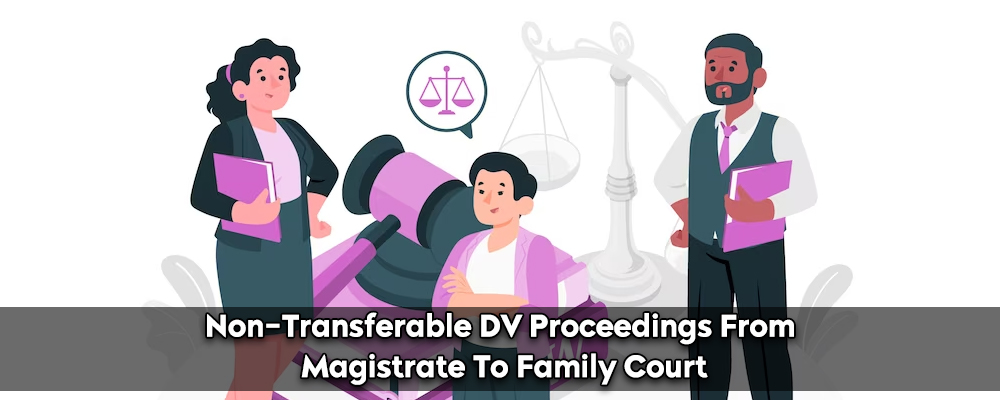A substantial step toward guaranteeing the welfare and safety of people within the family unit has been made through the Domestic Violence Act, a crucial legislative framework created to offer assistance and safety to victims of domestic abuse. The main goal of the Act is to address the complexity of domestic violence situations while providing victims with quick and effective remedies. But when it comes to moving cases started under the Domestic Violence Act from the magistrate’s court to a family court, a crucial question comes up.
Significance of the Role of Magistrate
In the legal system, magistrates are crucial, especially in situations involving domestic abuse. To preserve the security and well-being of victims, it is essential that they are able to offer prompt cures and preventative actions. Magistrates are well-versed in the subtleties of domestic violence situations and can issue specialized orders to deal with the particulars of each case. One of the main reasons why actions taken under the virtue of the Domestic Violence Act before a Magistrate shouldn’t be transferred to a Family Court is this specialization in handling delicate issues.
Need A Legal Advice
The internet is not a lawyer and neither are you. Talk to a real lawyer about your legal issue

Reason for Non-transferable Proceedings from Magistrate to Family Court
The reasons for the non- transferable proceedings from the Magistrate Court to Family Court are as follows-
- Magistrates have expertise in addressing domestic violence cases and comprehending the intricate aspects of abuse in familial settings.
- Magistrates guarantee quick decisions, but Family Courts handle a variety of situations and could experience delays if the case is transferred.
- Magistrates specialize in domestic violence matters only, ensuring individualized protection orders and avoiding backlog issues.
- Magistrates’ courts offer a private setting where victims can open out about their experiences without feeling threatened, upholding their dignity.
- Magistrates take into account larger family dynamics to ensure that protection orders are in the best interests of all parties.
- As envisioned in the Domestic Violence Act, non-transferability protects victims’ rapid access to appropriate remedies.
- Retraumatization is reduced when transfers are avoided because sufferers are spared from having to again describe terrible occurrences.
- When handling sensitive information, magistrates find a balance between impartiality and confidentiality.
- Supporting non-transferability gives Magistrates more authority and strengthens their responsibility in preventing domestic abuse.
- Domestic violence cases are handled consistently because of non-transferability, avoiding inconsistencies in court judgments.
Role of Judiciary: Kerala High Court
- In the case of Vineet Ganesh v Priyanka Vasan, the Kerala High Court ruled that cases brought under the virtue of the Domestic Violence Act before a Magistrate cannot be moved to a Family Court. This choice was made in light of the unique knowledge and effectiveness that Magistrates bring to proceedings when it comes to dealing with domestic violence cases.
- The decision of the Kerala High Court was significantly influenced, among other things, by the notion that magistrates are uniquely qualified to manage the complexities of domestic abuse cases. They are able to arrive at well-informed judgments that balance the demands of justice and instant alleviation because they have a thorough awareness of the complicated dynamics at work within families.
Efficiency and Quickness in Relief Delivery
- The possibility of delays in offering victims relief is a key issue when proceedings are transferred to Family Courts. Family Courts have a heavy caseload because they handle a variety of situations, such as separation, custody of children, and property disputes. Domestic violence cases could unintentionally cause backlogs and lengthen the process of victims seeking protection orders by being added to this mix.
- The Kerala High Court stressed the importance of fast resolution in domestic abuse cases after acknowledging this potential for delay. The court made sure that victims receive prompt support and protection by confining the proceedings under the purview of Magistrates, so lowering the potential for future harm.
Conclusion
The recent decision by the Kerala High Court maintaining the Magistrates’ sole jurisdiction in cases brought under the purview of the Domestic Violence Act represents a significant advancement in the fight for victims of domestic abuse to receive justice. The ruling recognizes the Magistrates’ particular knowledge, effectiveness, and tact while resolving these difficult matters.
The court has reaffirmed the crucial role of Magistrates in delivering quick protection and relief to victims while upholding their rights and dignity by barring the transfer of such procedures to Family Courts.
One can talk to a lawyer from Lead India for any kind of legal advice. In India, free legal advice online is achievable at Lead India. Along with receiving free legal advice online, one can also ask questions to the experts online free through Lead India.





 Talk to a Lawyer
Talk to a Lawyer